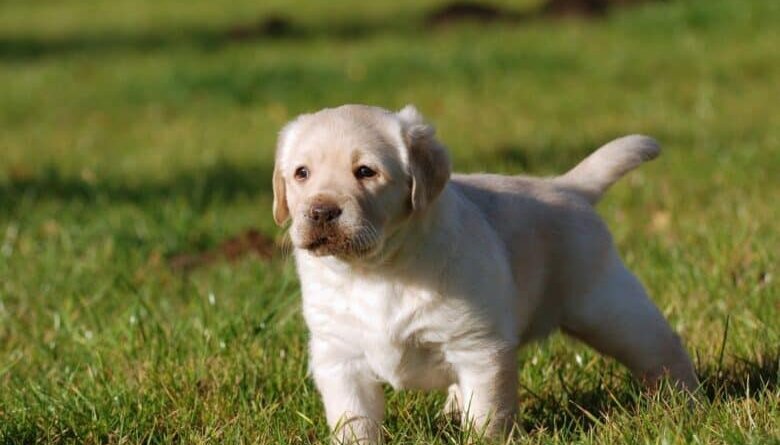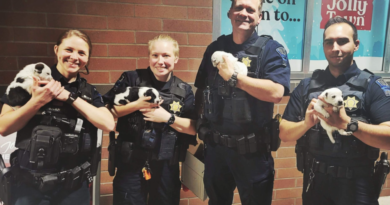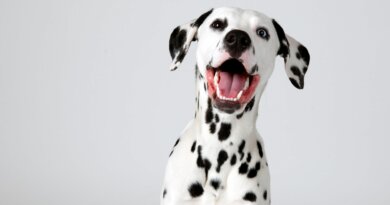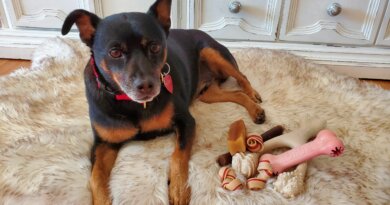Puppy Potty Training Regression: How To Potty Train a 4-Month-Old Puppy
[ad_1]
This post may contain affiliate links. We may earn money or products from the companies mentioned in this post.
You love your puppy and spent so much time house training her.
Little Bella was so difficult to potty, but you hung in there and now that she’s four months old, she rarely has an accident.
You’re so proud.
But, at four months old, she’s starting to act as if she’s never been trained. So, now you’re wondering how to potty train a 4-month-old puppy.
You start to panic. But don’t. Believe it or not, this is normal.

What Happens When a Puppy Turns Four Months Old?
Assuming you’ve gotten your puppy at eight or nine weeks old, he’ll have learned a lot. You’ve put time into his house training, crate training, and more.
By the time your puppy reaches four months old, it’s a light-bulb moment. He’s learning and retaining his training at a rapid pace.
He usually is crate trained, assuming you’ve worked with getting him used to being crated.
He’s getting his adult teeth. So he’s losing those needle-like shark teeth. And he’s mouthing less.
The muscles controlling his bladder are starting to become fully developed.
He’s often done with all of his vaccinations around four months old and can be taken more places after they’re effective.
You’re a proud puppy parent. It looks like smooth sailing from here on in. Then, you seem to hit the proverbial wall.
All your work seems to have gone out the window after he’s four months old.
Don’t despair. There are reasons for this happening.
Why Does Puppy Potty Training Regression Occur?
There are many reasons why a puppy may seem to have forgotten his prior potty training. The regression usually occurs between when the pup’s four months and a year old.
Regression is a psychological term that describes reverting back to an earlier stage of development. So the pup may return to a stage when he wasn’t potty trained well or at all.
Regression is normal, so don’t panic.
1. Change in Circumstances
Any change in circumstances, like scheduling his potty breaks and when he eats, may result in some accidents.
Sometimes, after four months old a puppy’s feeding schedule changes, He may go from three meals to two a day or from four to three.
Of course, when he has to potty will change then. What goes in must come out.
So your schedule will change too. But it may take a while to get the pup back on track with his new potty schedule.
Changes in household members or their schedules may also occur. Sometimes job or school schedules change.
And this may mean that the dog isn’t taken out as often to go to the bathroom. He may have accidents then.
Or sometimes the stress of household changes may upset the puppy, causing him to potty more often.
2. Unreasonable Expectations
Sometimes we expect too much. The four-month-old puppy was doing so well, that we may start to expect too much of him.
We may expect him to “hold it” for too long or otherwise ask too much of him too soon.
3. Too Much Time in the Crate
After a puppy is doing really well with his potty training, sometimes we expect too much of him.
And he may be left in his crate too long and have an unavoidable accident.
As a general rule, puppies can “hold it” for about one hour longer than their age in months.
So a four-month-old puppy will be able to not potty in his crate for about five hours.
So remember to still take him out to potty regularly on schedule from his crate.
4. Medical Issues
Medical issues may have developed. He may be having accidents because he has a urinary tract infection or worms.
If he suddenly starts having accidents despite your re-training him again, a vet check is in order.
5. Separation Anxiety
Everyone in the family is in love with the new puppy for the first few months. He may rarely be left alone.
But other life events start to take up everyone’s time.
Then, the pup starts to panic. Where’s everyone gone? Are they coming back?
He may start to have separation anxiety. And this may manifest itself in having potty indiscretions.
6. Not Properly Trained or Trained at All
He may not have been properly trained to begin with. He may have had very few accidents because he was taken out a lot.
But he may not have understood the rules.
Or he may not have received the proper house training.
What seems like puppy house training regression may actually occur because the puppy wasn’t yet fully house trained. You may have gotten him at 12 weeks of age.
So, When he’s 16 weeks old, he hasn’t had enough training yet to fully understand what’s expected.
7. His Brain Chemistry Has Changed
Around four months old, your puppy’s brain chemistry is changing. His brain is still developing and he’s processing more and more information.
His brain is changing as he enters adolescence and approaches adulthood. This may result in many problematic behaviors.
Essentially, his mind can easily get jumbled with what he’s already learned. So one of his setbacks may be in the house training area.
8. Too Much Freedom Too Soon
Since your pup’s been so great at his four-month birthday, he’s probably been given more freedom.
Just make sure to not give him too much out-of-sight freedom too soon. Or potty accidents will be inevitable.
9. Fear Period
A puppy may experience a fear period around four months old. He may become afraid of one thing or many things–even those he had confidence with before.
He may start having accidents because of this fear.
10. Didn’t Let Him Out Often Enough
Sometimes the answer is as simple as the puppy needs to go out more often.
We may let down our guard when he’s around four months old because he was doing so well with his house training.
But the muscles in his bladder are just starting to be fully developed.
What Are the Signs of Puppy Potty Training Regression?
There are some signs to look for to determine whether your puppy is suffering from puppy potty training regression.
He Has Accidents in the Same Spot
One sign of regression is when your puppy who seemed to be house trained but suddenly keeps having accidents in the same spot,
But remember to appropriately clean up each accident with an enzymatic cleaner so that your pup’s not drawn back to that spot.
Puppy Potties When You’re Gone
Your puppy may have been fine when you left him. But suddenly he starts to have accidents when you’re gone.
Puppy Wants To Play, Not Potty
Your four-month-old puppy understood when he was being taken outside to go to the bathroom.
All of a sudden he just wants to play or explore–just like he did when he was first learning.
Puppy May Not Indicate When He Has To Potty
By four months old, your puppy let you know when he had to potty. He would go to the door, bark, or even ring a bell.
But suddenly he stops letting you know when he needs to potty. Instead, he just has an accident.
Puppy Has Accidents in the Middle of the Night
Your four-month-old puppy was sleeping through the night for five or six hours with no accidents.
Then, he suddenly starts having accidents in his crate even though he went to the bathroom right before you put him in his crate.
How To Potty Train A 4-Month-Old Puppy
There are steps you can take to get back on track. Don’t panic. Consistency and patience are important. So is a routine. Go back to basics.
Retrain
He needs a refresher course. You’ll need to go back a few steps and retrain your puppy as if he hasn’t been trained.
Don’t give him any out-of-sight freedom. Take him out to potty more often.
Puppies usually have to potty after sleeping, eating, playing, or chewing. I even interrupt the play and take the puppy out to potty to avoid an accident.
So use your potty phrase when you take him out. Take him out the same route to the same place to go to the bathroom.
Praise and reward with a small, pea-sized treat immediately after he goes to the bathroom.
When deciding on his potty schedule, take into account any changes in his feeding schedule.
And when you take him out to go to the bathroom remember that he’s only there to potty.
Don’t let him play then. You can take him out another time to go.
Make sure that he isn’t let out of your sight until he’s reliable again.
And don’t over-crate him longer than he’s able to hold his urine.
It’s important to remember too that the pup’s physical ability to not have accidents increases as he ages. He has more bladder control.
Deal With Behavioral Issues
If your pup has separation anxiety or is going through a fear period, you may need professional help to work through the issue.
Most dogs outgrow fear periods. You just have to make sure not to over-expose him to things he fears during that time. It may take days or weeks for him to go back to the confident dog he was.
Have Him Checked Out Medically
If you’ve tried to re-train and he still is having accidents, a vet visit is probably in order.
What Not To Do If You’re Experiencing Puppy Potty Regression
It’s frustrating if your puppy regresses in his house training after he’s four months old. But it’s still important to have a ton of patience during this time.
And use positive training methods. Harsh ones can only make things worse or lead to more problems.
Don’t Punish
Many years ago, some people regularly used harsh methods to try to house train a dog.
They swatted the pup with a newspaper or put the dog’s nose in his accident.
Or they yelled at the pup too.
Such methods don’t teach the pup what to do. And they may lead to your puppy being fearful of you.
Don’t Panic
As long as you try to figure out why your pup’s regressing and attempt to fix it, you should be fine.
As I discussed above, most puppies just need a refresher course in House Training 101.
Final Thoughts
If you’ve house trained your four-month-old puppy and he suddenly has some accidents, don’t panic.
He may have normal house training regression, which often occurs between four months and a year old.
Normally you can just take a step back and re-train him. And he’ll become the same reliable puppy you knew.
How about you? Did your puppy regress when he turned four months old?
Are you taking a step back and trying to figure out how to potty train a puppy at 4 months old?
Tell us about your puppy potty training experiences in the comment section below.
Save To Pinterest

Top Picks For Our Puppies
- BEST PUPPY TOY
We Like: Snuggle Puppy w/ Heart Beat & Heat Pack – Perfect for new puppies. We get all of our Service Dog pups a Snuggle Puppy. - BEST DOG CHEW
We Like: Best Bully Sticks – All of our puppies love to bite, nip, and chew. We love using Bully Sticks to help divert these unwanted behaviors. - BEST DOG TREATS
We Like: Wellness Soft Puppy Bites – One of our favorite treats for training our service dog puppies. - BEST FRESH DOG FOOD
We Like: The Farmer’s Dog – A couple months ago we started feeding Raven fresh dog food and she loves it! Get 50% off your first order of The Farmer’s Dog.
Check out more of our favorites on our New Puppy Checklist.
[ad_2]
Source link





what’s the difference between citalopram and escitalopram